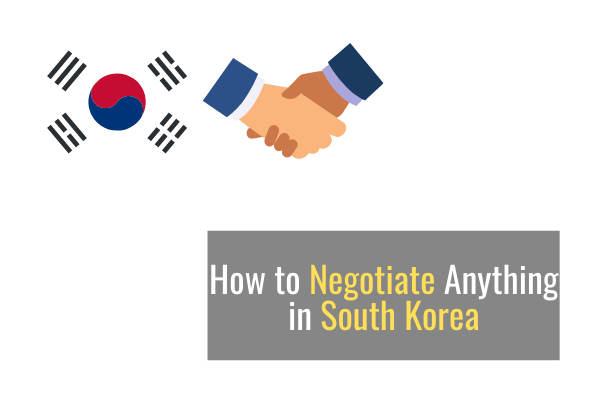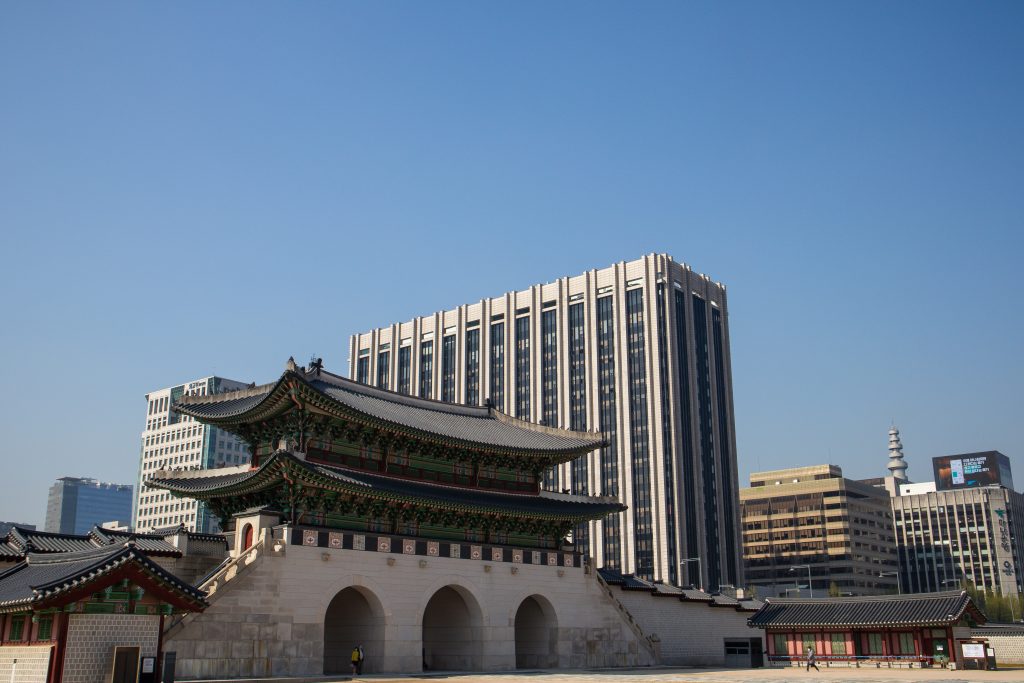This step-by-step guide shows you how to negotiate salary and business terms in Korea.
It includes:
- Getting a higher salary
- Asking for a raise
- Maximizing business meetings
- What to avoid
I’ve been running a business in Korea since 2013.

Quick Summary
- Present yourself well during the interview to have better leverage to ask for more salary.
- Most jobs have built-in raises every year but feel free to ask for more especially if your performance is above average.
It’s been said that everything is negotiable.
The same principle applies in Korea with a few adjustments. This guide will explain how and what you can negotiate while building long-term relationships.
Essential Tips for Negotiating in South Korea
Korean business negotiations are dictated by four principles:
- Nunchi (눈치) – intuition and emotional intelligence. Use your perception to gauge interest, hierarchy and etiquette.
- Gibun (기분) – mood and feelings. If the mood is good, things will be easier. If the mood is bad, you’ll want to adjourn for the day.
- Jeong (정) – unspoken bond. Build these through showing empathy and interacting during informal situations like meals.
- Chaemyeon (체면) – face or reputation. It’s very important that you establish yours and build up others.
Time, money and quality are the three main things you can negotiate. Knowing which ones are important to your counterpart will allow you to make adjustments.
For example, speed tends to be important in Korea. My translation business uses pricing that takes this into account. The faster the turnaround time, the higher the price we charge.
Here are a few ways to increase your chances of success:
- Read the room – if the mood isn’t good, keep things light and finish early
- Be modest – bragging about yourself or company will not win you any favors
- Have patience – expect to play the long game
- Build a relationship first – once you’re viewed as a friend, it becomes a lot easier to communicate
- Take your time – Koreans tend to view the western way of seeking a quick conclusion as desperation
- Read between the lines – signs of trouble will be hinted, but not revealed until the last moment
- Don’t reveal everything – keep your shortcomings and constraints to yourself
- Show sympathy – moods and difficulties are calculated into the negotiation process, so showing understanding will make things easier
- Have options and shop around – there are many companies in Korea and those in the same industry don’t collaborate (for example, Samsung and LG will never work together)

Salary Negotiation Tips while Applying for Jobs in South Korea

Most jobs are listed with a salary range (for example, 1.9 million to 2.1 million KRW a month). You always want to ask for the highest amount.
If you present yourself well during the interview, you’ll have better leverage to ask for more money.
More about Interviewing in South Korea
- Focus on their needs first – highlight your strengths and how they’ll help your employer
- Present yourself as a team player – show you work well with others by listening carefully and answering accordingly
- Wait until the end – don’t mention salary until the last moment
- Offer a concession – you’ll the sign the contract today for the higher end of the salary range
- Have a backup – if they say they cannot offer more salary, ask for a higher bonus or more vacation time
Asking for a Raise while Working in South Korea
Most jobs have built in raises every year. You’ll want to receive as much as possible. Asking is half the battle.
If your performance is above average, you’ll have better leverage to ask for more money.
More about Jobs in South Korea
- Be polite and modest – focus on why you deserve a raise and not why you’re entitled to it
- Keep track of your results – present hard numbers showing your performance
- Maintain good working relations – have decision makers know who you are and like you
- Time your conversation – schedule a meeting around the time raises are decided
- Explain your goals for next year – show that you plan on sticking around and getting things done
- Be specific – find out how much you’re worth and how much they can afford (refer to the Ministry of Labor, Statistics Korea or annual salary disclosure sites)
- Have a backup – if they say they cannot offer a higher raise, ask for a higher bonus or more vacation time
- Document everything – if they agree to a raise amount, either sign a new contract or ask for it in writing
A Common Negotiation Situation in South Korea

Adam Smith is going to Korea to find a bidet supplier for his medium-sized import/export business in the Midwest. He wants to get the lowest price possible for 1,000 bidets a month.
He contacts a large Korean company who agrees to meet with him. He goes alone to the meeting while the Korean company sends three people, a senior manager, a junior employee and a new hire who studied in the U.S.A for a year.
Adam doesn’t bring a small gift. He tries to negotiate price in the first ten minutes, which his counterparts interpret as desperate and borderline rude.
They end the meeting early and Adam is given the run around for the next two weeks ending in failure.
Read on to see what went wrong.
Business Meeting Negotiations in South Korea
Here’s what to expect during Korean business negotiations.
Preparation
- Set up meetings with as many companies as possible. There are many ones to choose from and having options will make things easier.
- Find out who will attend your meeting and what their titles are. Try to bring the same number of people to your meeting of similar age and company rank.
- Research what their company’s goals, strengths and weaknesses are.
- Prepare a small gift for each person or a large gift that can be shared.
During the meeting
- Read the room. If there’s a tragedy that day, keep things light and brief.
- Be modest about you and your company. Talk briefly about your goals and how they align with those of your counterpart.
- Listen carefully to what they need and what their fears are.
- Be patient and don’t expect results right away.
Negotiating
- Don’t start negotiating until you feel there’s a camaraderie.
- Don’t offer concessions first unless you have a great working relationship with them. They will ask for more.
- Those who work at larger companies will expect more concessions and devotion.
- Expect the unexpected. Don’t be caught off guard. This includes unforeseen costs and obstacles.
- Stay polite and pleasant but firm.
- Be prepared to be asked for a discount and have a corresponding demand.
- Try to schedule a meal together, even if your goals are met.
After the meeting
- Follow up in a few days and schedule another meeting if necessary.
- Don’t be surprised if they appear too busy or cancel on you. Life in Korea can be full of appointments, meeting and other surprises.
- Multiple cancellations signal trouble with the company or lack of interest.
Signing contracts
- Contracts are more or a road map than an ironclad agreement in Korea.
- Always try to set arbitration in your home country.
- Sign a contract with the main company or the one with funding, not a subsidiary.
My Experience Negotiating in Korea
I worked part-time for a recruiting company for a few years and had a close relationship with the owner. It was a medium-sized company of around 100 employees.
I negotiated a salary of 7 million KRW per month with the owner to start working full-time. That night, I received a call from her right-hand man telling me to accept 5 million KRW, because she consulted with her husband who said the original amount was too high. The reasoning was that other employees would want more money.
I took this personally as you can imagine. I understand now that this is how things are done. A deal and even a contract are considered living organisms that can change.
I could have played hardball and threatened to walk, but that was still a good salary at the time. In hindsight, I should have asked for more vacation time or a larger year-end bonus. Long story short, I took the 5 million KRW and was the highest paid person at the company for the 5 years I worked there.
More about living in South Korea as an Expat
After I started a business in Korea, my partner and I cold called potential clients and set up meetings. I made many mistakes, but being late and not bringing a proper small gift were instant fails.
I found that the best way to get them to try us was to show briefly what we did well, while focusing on their company and what their goals were. Listening carefully was key here.
Most of our clients were extremely busy and needed translation on-time and error-free. We accommodated them by being low-maintenance and always delivering on-time.
The majority of our clients were great and we still work with them today.
The most difficult ones were from large companies who asked for discounts in the first meeting. They sent us files with 5-hour deadlines that didn’t allow for proper quality control. It was necessary to terminate these partnerships after a few months. I learned that it’s important to cast a wide net when it comes to doing business in Korea.
FAQ
Which language should I speak while negotiating in Korea?
Unless you’re very comfortable in Korean, English will give you an advantage.
When is the best time to ask for a salary raise in Korea?
Near the end or beginning of the year at most companies. Some companies have raises in July or a year after you’re first hired.
Who should I ask for a raise in Korea?
It depends on the size and structure of the company. Your immediate supervisor or someone in management whom you have a good relationship with.
What should I avoid during negotiations in Korea?
These are some common mistakes when negotiating in Korea:
- Bragging
- Being in a hurry
- Being uncomfortable with change or the unexpected
- Being too direct
- Dominating the conversation
- Not focusing on the relationship first
Did we miss anything?
Negotiating is a challenging but necessary part of doing business in South Korea.
Let us know your negotiation tips in the comments below!


